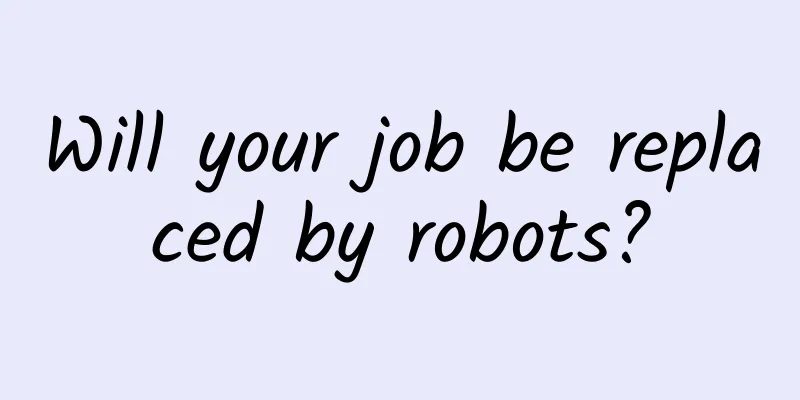Will your job be replaced by robots?

|
Google has been making a series of moves in the field of robots and artificial intelligence recently. First, it signed an agreement with Johnson & Johnson to jointly develop medical robots with artificial intelligence. Later, it announced that it had obtained a patent in the United States for a system for implanting specific personalities into robots. The former is nothing new. Whether it is the "Da Vinci Tools" robotic surgical system developed in the UK or the "Raven" series of remote surgical robots that the US military has put into use in war, they have reached a fairly high level of technology. As for the latter, according to the relevant patent description, it is just a simple replication of human behavior patterns, far from the level of giving robots a real "personality". We certainly don't think that such progress will lead to the extinction of mankind. It is also boring to always talk about the threat of robots and artificial intelligence, but we might as well talk about a much simpler topic that is closely related to everyone's life: Will your job be replaced by a robot? This topic may sound a bit far-fetched, but in fact, many Foxconn workers should have already felt the competition from robots. Last month, Foxconn's parent company, Hon Hai Technology Group, announced that it would introduce thousands of robots to replace human labor to reduce labor costs. At the same time, Hon Hai Group's president, Terry Gou, revealed to the media that Hon Hai is preparing to automate 70% of its production lines within three years, and he plans to replace workers with robots to improve production efficiency. As early as 2011, Terry Gou had made a similar statement that Foxconn would introduce one million robots to replace workers, and Foxconn currently employs about one million workers in mainland China. From the perspective of economists and critics who are concerned about Foxconn's labor ecology, this plan will alleviate the labor shortage currently faced by Foxconn and reduce labor disputes, allowing workers to get rid of endless overtime and simple mechanical labor. Many optimistic financial commentators said that the popularization of robotics can free workers from monotonous, heavy and even dangerous working environments, making their work and life more comfortable and dignified. As for the job cuts that may be caused by robotics, many economists believe that the lost jobs will be supplemented by other aspects, such as robotics manufacturing. This line of thinking often reminds people of the plot in the movie "Charlie and the Chocolate Factory". Charlie's father worked in the original toothpaste factory, responsible for screwing the caps on the toothpaste bags filled with toothpaste. However, in order to improve production efficiency, the toothpaste factory purchased a robot to screw the caps on the toothpaste. Charlie's father lost his job and the family's life fell into hardship. However, at the end of the movie, Charlie's father found a "better job", still in the toothpaste factory where he worked before, but he was responsible for repairing the robot that took his job. Of course, some economists have made more clear and firm statements, believing that even if unemployment occurs, it is normal. Mechanization and automation are the development direction of advanced productivity, and sacrifices are necessary. During the first industrial revolution in Britain, ordinary people whose jobs were taken away by machines rushed into factories and smashed machines, but the historical trend of mechanized production is unstoppable. As society develops and progresses, new jobs will always be created, and there is no need to worry too much about it. However, Eric and Andrew from the Massachusetts Institute of Technology do not think so. In their co-authored book "Race with the Machine", they demonstrated Rifkin's assertion about the "end of work", arguing that technological progress has made it necessary to produce fewer and fewer workers for the same goods, and eventually the number of workers will approach zero. This is undoubtedly a disturbing conclusion, and Eric and Andrew tried to solve this problem through "organizational innovation." They believe that crowdfunding and crowdsourcing models represented by Kickstarter and Amazon's "Turkish Mechanical" will bring vitality to the United States, which is stuck in a stagnant median income. However, in China, the problem we face may be more serious. Among the unemployed in the United States, workers with medium-level professional skills account for a large proportion. Even so, a large number of workers are still out of the game in the competition with machines; Chinese workers, especially migrant workers, often appear more vulnerable when facing competition from robots. They often do not master special professional skills, and their only advantage is low cost. In addition, the problems of many second-generation migrant workers are even more serious. Many of them have not even mastered basic agricultural skills and are more dependent on the conveniences brought to them by modern urban life than their parents. In a sense, these young people belong to the city, and it is difficult for them to return to the land. And with the continuous advancement of agricultural mechanization, even if they return to the countryside, they may find it difficult to find their own foothold. They will be the generation facing competition from robots. If they cannot win this competition, it will be a huge tragedy. Although I think migrant workers will be the first to face the impact of robots, it does not mean that people engaged in other so-called intellectual labor professions do not need to worry. The impact of technology comes from all aspects, for example, the impact that online education may have on the teaching profession, etc. How to deal with the impact of technology is a question worth thinking about for each of us. I don't know if there is such a thing as a "dishonorable" job in the world, but I know one thing very clearly: nothing can make a person lose his dignity more easily than being unemployed. As a winner of Toutiao's Qingyun Plan and Baijiahao's Bai+ Plan, the 2019 Baidu Digital Author of the Year, the Baijiahao's Most Popular Author in the Technology Field, the 2019 Sogou Technology and Culture Author, and the 2021 Baijiahao Quarterly Influential Creator, he has won many awards, including the 2013 Sohu Best Industry Media Person, the 2015 China New Media Entrepreneurship Competition Beijing Third Place, the 2015 Guangmang Experience Award, the 2015 China New Media Entrepreneurship Competition Finals Third Place, and the 2018 Baidu Dynamic Annual Powerful Celebrity. |
<<: Why is everyone keeping silent about fake TV ratings?
Recommend
Strong winds and sandstorms will hit tomorrow! How to avoid "eating dirt"?
Yesterday, snowfall occurred in Qinghai, Heilongj...
How many minutes should you boil eggs to make them tasty? This experiment will tell you!
You have all eaten eggs, right? There are so many...
World AIDS Day丨Understand and correctly view AIDS
China Science and Technology News Network, Decemb...
Why mobile game developers need to take piracy seriously
By now, almost everyone in the mobile space has h...
A 39-year-old vegetarian internet celebrity in Russia has passed away. He used to insist on eating only fruits. Is it good to be a vegetarian? Here are 11 common misconceptions
According to media reports, a Russian vegetarian ...
Not too hot, and still chewy, are cold Yuanxiao so delicious? I advise you not to eat it this way!
Happy Lantern Festival! Is it time to eat Yuanxia...
Where is the most beautiful ginkgo tree in China?
The ginkgo leaves are turning yellow, and autumn ...
Xiaohongshu agent operation: After operating Xiaohongshu for 2 years, I have summarized these experiences!
Xiaohongshu is a cross-border e-commerce platform...
Is the "quantum dot TV" that was popular in 2015 worth buying?
At the end of the year and the beginning of the n...
What did the Internet giants do on April Fools' Day?
Editor’s Note: Although this year's April Foo...
Is your mobile 4G network speed slow? Here's a way to make your Internet speed faster and more stable
Today I will teach you how to solve this problem....
The Zero Run incident happened again. Volvo test drive car's temporary license expired, causing the media person to be deducted 12 points
It has become an industry practice for manufactur...
WeChat takes up too much memory? Here's how to free up your phone in two minutes
When it comes to communication and chatting softw...
Super Fans Pass Advertising Steps
1. Overview of the Delivery Platform Super Fans L...
Why is the conversion rate so low?
"What would you like to drink? I want Coca-C...









